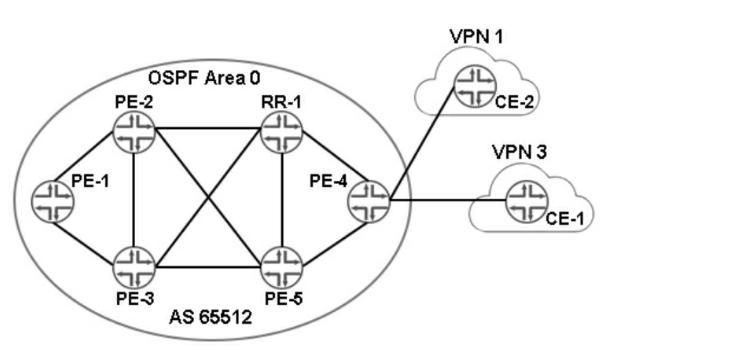Click the Exhibit button.

Referring to the exhibit, you have multiple Layer 3 VPNs established in your network. You are asked to ensure that PE-4 allows CE-2 in VPN 1 to communicate with CE-1 in VPN 3.
Which two statements are correct in this scenario? (Choose two.)
A. Use a BGP export policy to share the appropriate VRF routes.
B. Use the auto-export feature to share the appropriate VRF routes.
C. Use a BGP import policy to share the appropriate VRF routes.
D. Use rib-groups to share the appropriate VRF routes.


B and D are the correct answers
My answer is – BD
Link In support of my Answer –
B – https://kb.juniper.net/library/CUSTOMERSERVICE/GLOBAL_JTAC/auto-export-understanding.pdf
D – https://www.youtube.com/watch?v=JT7rwWM8Yn8
Correct Answer – BD
B. Use the auto-export feature to share the appropriate VRF routes.
D. Use rib-groups to share the appropriate VRF routes.
Link for answer B – https://kb.juniper.net/library/CUSTOMERSERVICE/GLOBAL_JTAC/auto-export-understanding.pdf
Link to answer D https://www.youtube.com/watch?v=JT7rwWM8Yn8
Correct Answer = BD
https://kb.juniper.net/library/CUSTOMERSERVICE/GLOBAL_JTAC/auto-export-understanding.pdf
RemoteprefixleakingtakesplacewhenthesourceVRFroutinginstanceanddestination VRFroutinginstanceareondifferentPErouters.ThisisachievedbyusingBGPextended community attributes through the use of the route-target community that works on remote PE routers, but not on local PE routers. Custom policies, such as vrf-export and vrf-import, do not leak prefixes between VRF routing instances if the source VRF routing instance and the destination VRF routing instance are on the same PE router.
Local prefix leaking is when the source VRF routing instance and the destination VRF routing instance are on the same PE router. Similar to the split-horizon rule, prefixes learnedonthePErouterfromlocalCErouterscanbesharedwithotherremotePErouters, but the routes cannot be shared locally.
The Auto Export feature leaks prefixes between VRF routing instances that are locally configured on a given PE router. The Auto Export feature is enabled by using the auto-export statement.
Auto Export is always applied on the local PE router, because it takes care of only local prefix leaking by evaluating the export policy of each VRF and determining which route targets can be leaked locally. The standard VRF import and export policies still affect only the remote PE prefix leaking
BD
D – 2 rib groups to cross to cross import vpns . Under bgp unicast would need to reference the rib-group and under routing-options/interface-routes as well
Yura is right, B&D
should be A&B
as per juniper:
Auto export is always applied on the local PE router, because it applies to only local prefix leaking by evaluating the export policy of each VRF and determining which route targets can be leaked. The standard VRF import and export policies affect remote PE prefix leaking.
BC
Both AB and BC are technically correct, however the question states ‘to share’, so that`s export.
When you need to mutually interconnect two existing VPNs you have to modify _import_ policy to match and accept routes with corresponding vrf rt-s. Export policy may remain the same.
Therefore A is not mandatory, but C is.
AB
https://www.juniper.net/documentation/en_US/release-independent/nce/topics/example/auto-export-configuring-verifying.html
BC